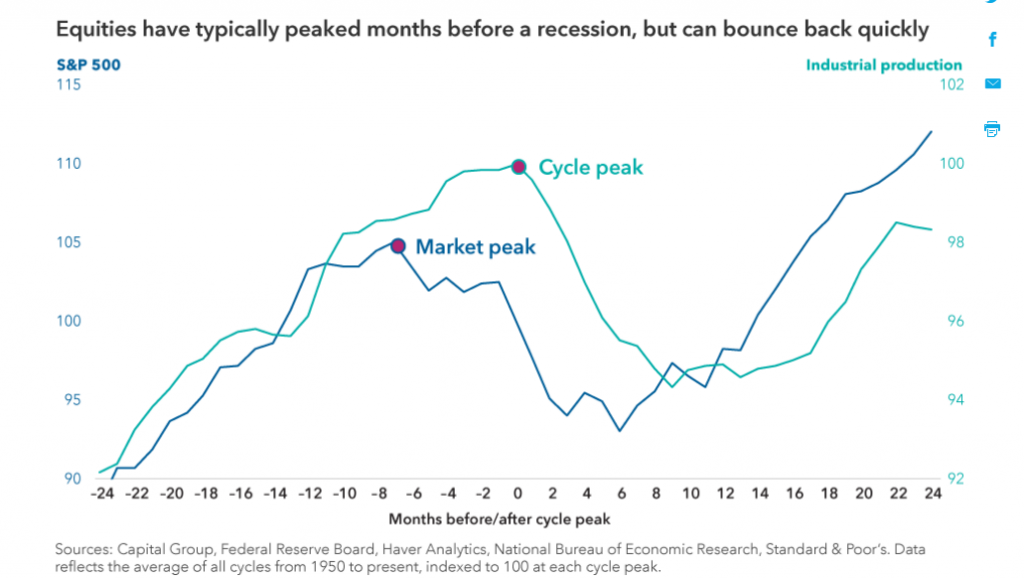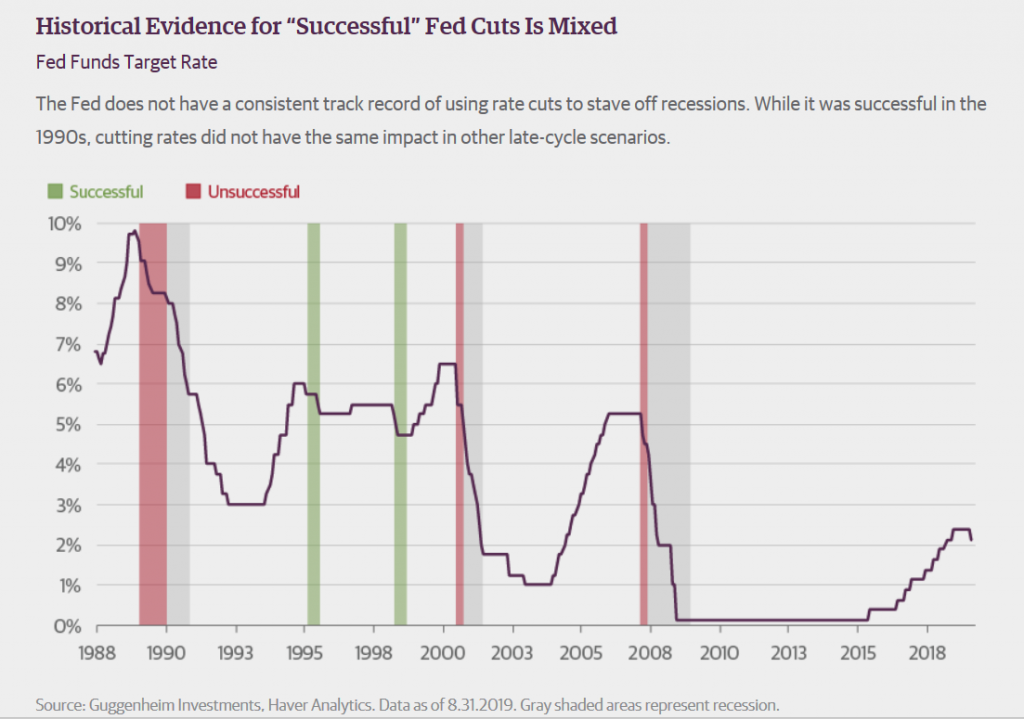1.Equities Peak Months Before Recession
Capital Group

Investing ahead of a recession: 5 mistakes to avoid
https://www.thecapitalideas.com/articles/investing-ahead-recession-5-mistakes
2.High Yield Busiest Issuance in 2 Weeks…$1.9B in Retail Inflows.

Bloggers noted the massive issuance of HY as investors hoover up the debt.—From Dave Lutz at Jones Trading
High Yield HYG ETF

3.Historical Evidence for “Successful” Fed Cuts.
Guggenheim

4.Snapshot of Rising Tariffs.

These 4 charts show how US-China trade has changed during the tariff dispute–Yen Nee Lee
5-6.The Daily Shot with Great Summary of Current Homebuilder/Home Buying Market

However, homebuyers have been increasingly concerned about high prices.

Source: Arbor Research & Trading
And many Americans expect rates to fall even further next year.

Source: @WSJ; Read full article
7.Consumer and Government Spending Dominate GDP.
Chart of the week
Composition of U.S. gross domestic product, 2010-2019

Sources: BlackRock Investment Institute, with data from the U.S. Bureau of Economic Analysis, September 2019. Notes: The chart shows the annual rate of U.S. GDP growth broken down by components through the second quarter of 2019. Personal and government spending refers to a combination of personal consumption expenditures; government consumption expenditures and gross investment. Capex refers to non-residential domestic gross investment, and housing refers to residential investment.
BLACKROCK
https://www.blackrock.com/us/financial-professionals/insights/weekly-commentary
8.Streaming Wars Update
From Morning Brew Blog
| MEDIA New Fronts in the Streaming Wars |

Francis Scialabba
Comcast (+0.86%) cannonballed into the video streaming wars yesterday when it revealed the name of the streaming service it’s debuting in April 2020. The name’s “Peacock,” a nod to NBC’s logo. Our upcoming streaming service? “Chart Mug.” Short on details, long on nostalgia: We don’t know the exact date or Peacock’s pricing (other than it’s free for Comcast cable subscribers), but NBCUniversal is aiming to have a library of 15,000 hours of content at launch. Some of its new offerings: Saved by the Bell and Punky Brewster reboots A Battlestar Galactica adaptation A series based on Aldous Huxley’s Brave New World starring Demi Moore But don’t call it a pivot to sci-fi—NBCUniversal has also pulled turn-it-on-while-folding-laundry classics from Netflix like The Office (costing $100 million/year) and Parks and Recreation when those shows’ current Netflix deals expire toward the end of 2020. Netflix can’t seem to make ’em stay. Friends is headed to WarnerMedia’s HBO Max for $425 million. Netflix hopes to fill the ’90s New York sitcom hole with Seinfeld, whose rights it secured this week for over $500 million. And speaking of WarnerMedia… Pricey Sheldon Yesterday, HBO Max nabbed the exclusive rights to stream The Big Bang Theory domestically as part of a broader TV deal reportedly worth billions. Netflix still has the rights abroad. The series ended as broadcast’s No. 1 scripted half-hour series in the crucial “avocado toast and renting forever” demographic—adults ages 18–49. What’s going on: As tech invades Hollywood, every company launching a streaming service is rushing to lock down your favorite series and produce original content. The winner in all this? TV creators. So quit stalling and submit that pilot. https://www.morningbrew.com/daily/latest
Netflix -25% from highs

9.Passive Edges Active.

10.Want to Be a Leader? Lead Yourself First
By Michael Pietrzak | September 11, 2019 | 0

At 16, Nero became the emperor of the most powerful civilization in the world.
Barely out of diapers, he conquered new lands for Rome and quashed rebellions from the comfort of a palace of unimaginable luxury.
Despite his position, Nero has gone down in history for his extreme brutality—he executed rivals, his stepbrother and even his own mother. Historians suspect that he started the Great Fire of Rome to build a new palace, then blamed Christians as an excuse to execute them.
You’ve probably had a boss whose sadism and incompetence was not quite Nero-level but still left you wondering, “Who put this maniac in charge?”
To explain: Having a leadership role doesn’t make someone a leader.
Compare Nero’s reign to that of Marcus Aurelius, a successor. From what we know of “The Last of the Five Good Emperors” through his private writings, he was the leader we’d all want: balanced and fair, who took initiative, not needing credit or seeking power, and always eager to grow as a human.
A Mindset, Not a Role
If you’ve been lucky enough to have an Aurelius-type for a boss, you know that great leadership can create miracle-like results.
The right leader triples a company’s client base, solves a global problem, and nurtures his team members even beyond his own level.
That leader is effective not because of his or her job title but because of a leadership mindset.
Leadership is an attitude we can apply in every situation. When you start to see each moment as an invitation to lead, you’ll leap toward your highest potential.
This is true whether you’re a janitor or a father or a president.
“Not in my job,” you might say. “My boss gives me no autonomy” / “My work is meaningless” / “The shareholders would never go for it.”
The beauty of leadership? It doesn’t depend on external situations. Nelson Mandela led every day for 27 years in prison, though his only possession was a bucket-toilet.
To the true leader, an obstacle is only an exciting opportunity to find a new way forward.
Small Actions Save Lives
On November 18, 1987, commuters at King’s Cross Subway Station in Central London told ticket collectors about a bit of burning paper on the tracks. But staff were not allowed to leave their booths, so someone told his supervisor, who told her supervisor. We know how that goes.
In a few minutes, the fire was raging, and when layers of flammable paint in a tunnel ignited, the fire flashed over and killed 31 people, and injured another 100.
The inquiry that followed showed many fatal causes, but each stemmed back to a failure to lead. The ticket collectors failed to go look. Decades of painters failed to strip old paint (which they knew was flammable). And management upheld policies that discouraged initiative.
If one person had acted as a leader, those lives might have been saved.
In a world facing climate catastrophe and a resurgence of intolerance, our only hope is for more people to see themselves as leaders. Yes, that means you.
6 Self-Leadership Principles
First, you need to show that you can lead yourself. Here are six leadership principles that you can apply to your own life before you seek to lead others.
1. Take control of your thoughts.
All that’s ever been created was first thought. The novel you’re reading, your breakfast burrito, democracy, your general mood—were first ideas.
Top leaders know that what you think, you literally become. You cannot afford to let one negative thought into your mind because these spread and manifest in your words and actions.
Do you know any effective leaders who complain, ridicule or gossip? ‘Course not, so why would you? If you want to lead, watch your thoughts constantly and choose positive ones. Over time, it becomes habit.
2. Take initiative in every situation.
You probably know someone who always waits to be told what to do—a co-worker, family member or that stranger five feet away, idly watching as you struggle with the apartment door and bags full of groceries.
At work, initiative leads to advancement. Personal development legend Brian Tracy talks about the time he immediately started a new project, on a weekend, and uncovered a million-dollar fraud. His bosses were more than impressed.
Initiative is even more important in your own business. Ray Kroc would walk the parking lots of his McDonald’s franchises picking up garbage, sending a clear message to his employees that details matter. And it’s attention to detail that helped McDonald’s succeed (for better or worse).
3. Prioritize “great work.”
We run into a friend we haven’t seen in a while and ask, “How’s it going?”
“Good—busy. So busy!” is usually the reply.
Virtually everyone’s calendar is stacked tight as a pile of bricks, where no light can get through. Yet what percentage of people would you rate as highly “effective”?
People work, but not always on what matters. A leader effectively prioritizes his or her own life, ruthlessly cutting the good for the great.
I’d love to shoot under 100 on the golf course, bake my own bread and learn to lip read. But for now I’ve had to back burner these pursuits. Everything has an opportunity cost.
Leaders first make time and space to reflect on their own life, and then prioritize.
4. Let go of needing to “get credit.”
When our kids clean their room only to collect their allowance.
When a tobacco company spends $10 million on ads to tout the $50,000 they spent on cancer research.
When a politician finds a clever loophole to use public money to tell you how fiscally responsible he is.
Does this inspire a sympathetic response? No. We don’t follow shameless glory-seekers.
A focus on what you can get brands you as a self-serving. Plus, with one eye on the credit prize, you have less time and energy to do the job well.
Leaders do their duty without needing praise.
5. Keep your cup empty.
A professor of Eastern Philosophy travels to a Tibetan monastery to meet with a guru. They sit as the visitor relates all that he knows about enlightenment.
“Would you like tea?” asks the sage.
As he pours, the professor continues to talk. The cup overflows.
“What are you doing?” the man asks.
“Like the cup, you’re already full of ideas. How can more go in until you empty your cup?” says the guru.
A leader doesn’t have all the answers. She is someone who is always on the lookout for better ideas. And she applies that attitude full time.
6. Prioritize personal growth.
When I was 24 and shopping for a wedding ring, I couldn’t understand why my friends had relationship problems. Love was so easy, I thought.
Roughly 15 breakups later I learned the hard way that, the more you think you have “figured it out,” the harder the fall.
Psychologists who studied winning and losing noted the same, fascinating effect. Those who won a challenge became entrenched in their habits while the “losers” reflected and performed better over time.
In our own lives, we enjoy a bit of success but then forget that situations change, and luck plays a role in that success.
The best antidote to getting stuck in a rut is to treat yourself as your own one man or woman corporation. Leaders set targets, prioritize growth and remain flexible.